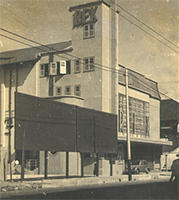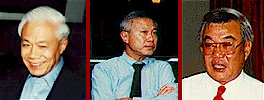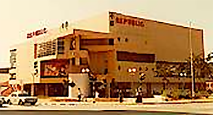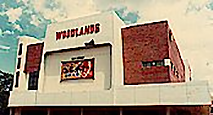ABOUT SHAW /
Shaw Organisation, Singapore 80s Shaw Organisation, Singapore 80s
Shaw Organisation, Singapore 80s
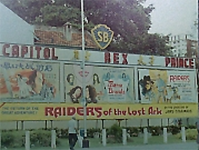
Shaw billboard, 1980s
By 1979, cinema attendance in Singapore peaked at a record-breaking 46.1 million. This figure was slashed to nearly half by the mid-80s due to rampant video piracy and the recession. In Malaysia, the competition from TV3 also added to the problem. As a result, Shaw & Shaw began redevelopment of several cinema sites for alternative utilization. A few cinema halls were sold or leased to churches.
Following Grand, Pacific, Hoover, Queens and Ciros, Rex (below) shut its doors for the last time on December 15, 1983. The historic cinema that began operations in 1946 with "The Jungle Book" and trembled audiences with "Sensurround" in "Earthquake" spelled the end with "Jaws 3-D". It was converted into a venue for 'live' shows and eventually, into a skating rink.
At this time, Shaw management duties were delegated to the second generation (from left to right) Vee Meng Shaw, Harold Shaw (sons of Sir Run Run) and Vee King Shaw (son of Tan Sri Dr Runme). The new management team effectively restructured and reorganized the company to meet the demands of the 21st century.
To win back their cinema audience from video pirates, the team extensively upgraded its President, Republic (bottom left), Changi and Woodlands (bottom right) cinemas in the suburbs. New seats and better equipment were installed to widen the gap between watching 'scratchy' pirated tapes at home and a 'quality' experience in cinemas.
In addition, the team also struck deals with fast food chains to provide cinema patrons with snacks. Going to the movies could now become an end in itself.
By the late 80s, the team began building cineplexes in order to give themselves more flexibility in offering different types of films.
The cineplex could offer films of limited appeal to a smaller audience in one hall while a blockbuster could be shown in a larger hall. Greater choices of films under one roof helped tackle empty seats that was prevalent in large single hall cinemas.
With the completion of the Prince and Jade cineplexes in the Hong Kong owned Shaw Towers, the team were the first to introduce into Singapore the concept of cineplexes, which has become a standard for the cinemas of today.
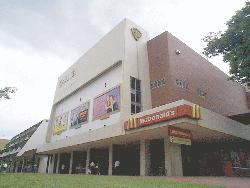
Changi Cineplex
Prince 1 and 2 were officially opened on Feb 10, 1988 with 5 shows of Jackie Chan's Dragons Forever. Jade 1 & 2 were opened officially on May 13, 1988. Jade 2 eventually became Jade Classics in 1991 to cater to the niche art house crowd, opening with Cyrano de Bergerac, starring Gerard Depardieu.
In succession, Oriental, Republic, Changi and Woodlands were converted into cineplexes. To further attract cinema going audiences, the team began aggressively promoting their films and cinemas by boosting its advertising budget.
Release of Hollywood blockbusters were also timed as close as possible to the US release to combat piracy.
In 1984 Shaw began diversifying its interest in Malaysia in line with the New Economic Policy. By 1988, the company was reorganised under the umbrella of The Shaw Organisation Pte Ltd. Besides show business, the Shaws have more than 15 subsidiaries operating office blocks, apartment buildings, shopping arcades, hotels, amusement centres and multiplexes.
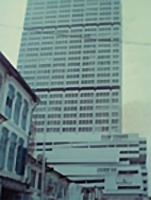
Prince and Jade, Shaw Towers
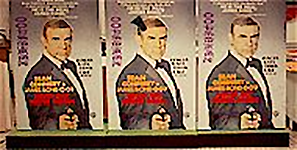
Never Say Never Again publicity standee.
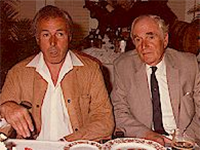
John Glen, director of the movie and David Llewelyn who plays "Q" visiting Shaw Centre in Singapore.
Shaw Studio, Hong Kong, 1990s
Filmmaking at the Shaw Studio's stopped in 1983 as television production began in earnest at TVB, Shaw's associate company (see further section on TVB). For over a decade, the Shaw studio lots were leased out to TVB for television productions as well as other movie production companies. Then in 1995, Shaw started making movies again!
"Out of the Dark" (1995) starring Stephen Chow and "Loving You" (1995) starring Lau Ching Wan played successfully all over Asia.
Other films followed in 1997 with 'The Hero' starring Takeshi Kaneshiro and Yuen Biao, 'The King of Masks' and 'Lifeline' starring Lau Ching Wan and Carmen Lee.
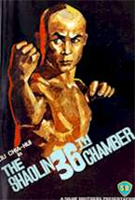
The Shaolin 36th Chamber, 1978
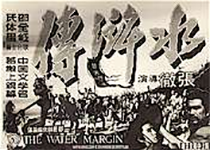
The Water Margin, 1972
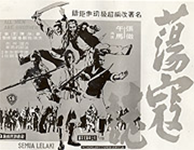
All Men are Brothers, 1975
By the late 90s, Shaw's valuable library of films spanned over 800 titles - the largest Chinese language film collection in the world. None of these archived 'treasures' were ever released on television or video formats, although keen interest in acquiring rights to the library were constantly being expressed by various entertainment companies. Much-sought-after 'Jewels' in the library included Chan Koon Tai's 'Boxer From Shangtung' (1972), Wong Yue's 'Spiritual Boxer' (1975), Lam Doi's 'The Blue and the Black' (1966),
King Hu's 'Come Drink With Me' (1966) 'The Fourteen Amazons' (1972), Wong Yue's 'One Armed Swordsman'(1967) KO Lung's swordfighting films 'The Magic Blade' (1976) and Killer Clans (1976), the Five Deadly Venoms (1978) and 36th Chamber of Shaolin (1978).
By 2000, after much deliberation, Shaw entered into a conditional agreement to sell its entire library to Hong Kong based Celestial Pictures for HK$600 million (US$84m) along with all video, remake, sequel and theatrical production rights.
Celestial Pictures is a subsidiary of Usaha Tegas Sdn Bhd (UTSB), the privately owned Malaysian media conglomerate belonging to Malaysian tycoon Ananda Krishnan. UTSB also owns the Measat and Astro satellite operations.
The ambitious plan was to release the films on a new Chinese-language satellite TV arm to be launched worldwide, as well as on DVD and even theatrically.
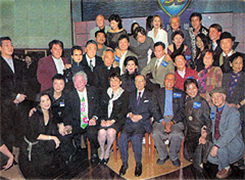
Shaw Classics Movie Festival, 2002
Over 3 years, the films were painstakingly restored and digitally remastered by Celestial. On December 12, 2002, the first ten including Kingdom and the Beauty (1959), Come Drink With Me (1966), Hong Kong Nocturne (1967) and 36th Chamber of Shaolin (1978) were released on VCD and DVD in stores all over Southeast Asia.
To commemorate the event, a Shaw Classics Movie Festival was launched in Hong Kong showcasing 7 of the films theatrically. The event was attended by Sir Run Run Shaw and Mona Fong along with many of the veteran Shaw artistes like Ivy Ling Po, Cheng Pei Pei, Ti Lung, Chin Han and Lau Kar Fai.
The opening ceremony were performed by Ivy Ling Po and Karen Mok who delivered vocal renditions of classic movie theme songs.



